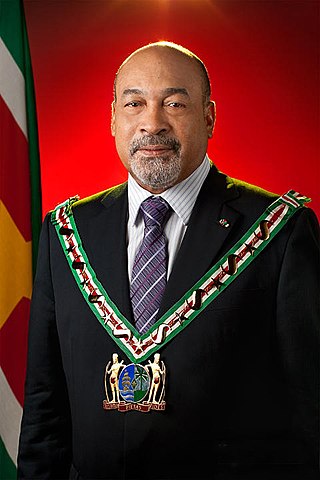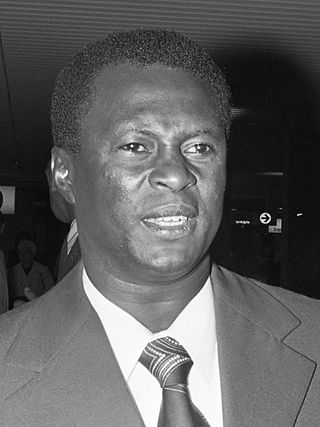Electoral results
| Election year | No. of overall seats won | +/– | Votes | % | Government | Representation |
|---|---|---|---|---|---|---|
| 1969 | 1 / 39 | 15,943 | 7.81 | Opposition | ||
| 1973 | 4 / 39 | Coalition | ||||
| 1977 | 0 / 39 | 5,871 | 4.75 | Extra-parliamentary | ||
Nationalist Republican Party Partij Nationalistische Republiek | |
|---|---|
| Founder | Eddy Bruma |
| Founded | 1959 |
| Dissolved | 1980 |
| Succeeded by | Surinamese Labour Party |
| Ideology | Social democracy Nationalism |
The Nationalist Republican Party (Dutch : Partij Nationalistische Republiek, PNR) was a political party in Suriname, existing from 1959 to 1980.
In 1951, Surinamese students in the Netherlands founded the cultural association Wi Eigi Sani ("our own things"). In 1959, the association became a political party under the name "Nationalist Republican Party" (PNR), and began its activities in Suriname. In the 1969 parliamentary election, the party secured one seat, by Eddy Bruma. In 1973, in a coalition with the National Party of Suriname, the party won 4 seats in the parliament. In the cabinet of Henck Arron [1] from December 24, 1973 to 1977, the cabinet consisted of 3 representatives of the party.
In 1977, the coalition broke up and the Nationalist Republican Party went to the elections independently, without receiving seats in the parliament. On 25 February 1980, a military coup led by sergeant Dési Bouterse overthrew Arron's government. Bouterse began to rule Suriname as the head of the National Military Council, created by him. He dissolved the parliament, abolished the constitution, introduced a state of emergency in the country and created a special tribunal that examined the affairs of members of the former government and large businessmen. Members of the Nationalist Republican Party were members of the National Military Council. Party member Henk Chin A Sen was president from August 15, 1980 to February 4, 1982. [2] After the restoration of democracy in 1987, the party was not restored. The Surinamese Labour Party is considered to be the successor of the Nationalist Republican Party of Suriname.
| Election year | No. of overall seats won | +/– | Votes | % | Government | Representation |
|---|---|---|---|---|---|---|
| 1969 | 1 / 39 | 15,943 | 7.81 | Opposition | ||
| 1973 | 4 / 39 | Coalition | ||||
| 1977 | 0 / 39 | 5,871 | 4.75 | Extra-parliamentary | ||
The early history of Suriname dates from 3000 BCE when Native Americans first inhabited the area. The Dutch acquired Suriname from the English, and European settlement in any numbers dates from the 17th century, when it was a plantation colony utilizing slavery for sugar cultivation. With abolition in the late 19th century, planters sought labor from China, Madeira, India, and Indonesia, which was also colonized by the Dutch. Dutch is Suriname's official language. Owing to its diverse population, it has also developed a creole language, Sranan Tongo.

Desiré Delano "Dési" Bouterse is a Surinamese military officer, politician, convicted murderer and drug trafficker who served as President of Suriname from 2010 to 2020. From 1980 to 1987, he was Suriname's de facto leader after conducting a military coup and establishing a period of military rule. In 1987, Bouterse founded the National Democratic Party (NDP). On 25 May 2010, Bouterse's political alliance, the Megacombinatie, which included the NDP, won the parliamentary elections, and on 19 July 2010, Bouterse was elected as President of Suriname with 36 of 50 parliament votes. He was inaugurated on 12 August 2010.

The president of the Republic of Suriname is, in accordance with the Constitution of 1987, the head of state and head of government of Suriname, and commander-in-chief of the Suriname National Army (SNL). The president also appoints a cabinet.

The National Democratic Party is a political party in Suriname. It was founded on 4 July 1987 by Surinamese leader Dési Bouterse, and was one of the first parties in the country to have a stable base of support across different ethnic groups. In the 2015 general election the party scored 45.56% of the vote and 26 of 51 seats in parliament.

Henck Alphonsus Eugène Arron was the first Prime Minister of Suriname after it gained independence in 1975. A member of the National Party of Suriname, he served from 24 December 1973 with the transition government, to 25 February 1980. He was overthrown in a coup d'état by the military, led by Dési Bouterse. Released in 1981 after charges of corruption were dropped, he returned to banking, his previous career. In 1987, Arron was elected as Vice President of Suriname and served until another coup in 1990 overthrew the government.
The Progressive Workers' and Farmers' Union, widely known by its abbreviation PALU, is a leftist Surinamese political party founded on 12 March 1977.

General elections were held in Suriname on 25 May 2005. The governing New Front for Democracy and Development of president Ronald Venetiaan lost seats, remaining the largest party but failing to get a majority in the National Assembly of Suriname. Despite this Venetiaan was re-elected as president after obtaining sufficient support to win a majority in the election for president.

The 1980 Surinamese coup d'état, usually referred to as the Sergeants' Coup, was a military coup in Suriname which occurred on 25 February 1980, when a group of 16 sergeants of the Surinamese Armed Forces (SKM) led by Dési Bouterse overthrew the government of Prime Minister Henck Arron with a violent coup d'état. This marked the beginning of the military dictatorship that dominated the country from 1980 until 1991. The dictatorship featured the presence of an evening curfew, the lack of freedom of press, a ban on political parties, a restriction on the freedom of assembly, a high level of government corruption and the summary executions of political opponents.

Johannes Samuel Petrus "Johan" Kraag was a Surinamese politician who served as the President of Suriname from 29 December 1990, until 16 September 1991.

Hendrick Rudolf "Henk" Chin A Sen was a Surinamese politician who served as the President of Suriname from 15 August 1980 until 4 February 1982.

Chandrikapersad "Chan" Santokhi is a Surinamese politician and former police officer who is the 9th president of Suriname, since 2020. After winning the 2020 elections, Santokhi was the sole nominee for president of Suriname. On 13 July, Santokhi was elected president by acclamation in an uncontested election. He was inaugurated on 16 July.

Frederik Marinus Emanuel Derby was a Surinamese politician and trade unionist. He was the only survivor of the December murders. In the years before his death he fought for an investigation into these events, and he told what had happened to him in Fort Zeelandia.

Yngwe Elstak (1927–2010) was a Surinamese military officer. He was the first commander of the Surinamese Armed Forces, from November 25, 1975, until February 25, 1980.

Eduard Johan "Eddy" Bruma was a Surinamese politician, lawyer and writer.
The Progressive Surinamese People's Party was a political party in Suriname. The party was a member of the Christian Democrat Organization of America.

Edmund Alexander "Eddy" Hoost was a Surinamese politician and lawyer. He was Minister of Justice and Police between 1973 and 1977. After the independence of Suriname, he became the first Minister of Defence and served until 1977. He was one of the victims of the December murders.

The 1990 Surinamese coup d'état, usually referred to as the Telephone Coup, was a military coup in Suriname on 24 December 1990. The coup was carried out by the acting commander-in-chief of the Suriname National Army (SNL), Police Chief Ivan Graanoogst. As a result of the coup, President Ramsewak Shankar was dismissed from power, and parliament and government were disbanded.
Franklin Edgar "Frank" Essed was a Surinamese forest scientist and politician. He served as Minister of Development from 1958 until 1963, and 1969 until 1973. Essed initiated Operation Grasshopper which build airstrips in the interior to map natural resources.